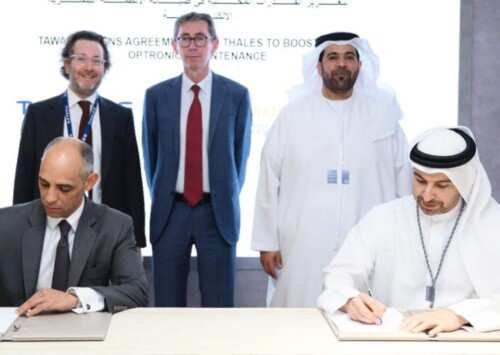World needs a rare ‘Earth-Deal’, not another ‘rare-Earth’ deal
Days before COP30, climate change put in closet in Trump-Xi meet

United States President Donald Trump meeting Chinese President Xi Jinping in Busan recently (Photo: POTUS)
The recent summit between the Presidents of United States and China was an ideal opportunity for the two countries to take stock of the current state of climate change, as the summit took place barely a fortnight before the next climate change summit, COP30, begins in Brazil. Instead of working towards a deal to save the Earth, the two leaders focussed on signing a rare earth deal.

United States President Donald Trump meeting Chinese President Xi Jinping in Busan recently (Photo: POTUS)
If you ever needed proof that humanity is not suffering from a climate-crisis but from a leadership-crisis to deal with climate change, look no further than Busan in South Korea.
Just 15 days before global climate negotiations in COP30, the global climate change summit as the world braces for another round of desperate negotiations over the planet’s future, President Donald Trump and President Xi Jinping of the United States and China, respectively, sat across the table and talked about tariffs and ‘rare-earth’ metals without even a single reference to climate change and COP30. And that too when Xi has such a proven and globally applauded climate-leadership that he could have certainly leveraged with conviction in Busan.
Ignoring the obvious pull of a planet on fire, the two giants chose to haggle over making magnets from rare earth and as a result, the planet’s most urgently needed agreement was lost in the intense haggling that preceded the US-China deal on rare earths.
In face of the world burying its head in the sand of short-term interests and lack of a strong political will, the global climate change situation is degrading by the day. According to the latest emission gap report released by the United Nations Environment Programme (UNEP), global Greenhouse Gas (GHG) emissions reached a new high of 57.1 gigatonnes of CO₂ equivalent in 2023, a 1.3 pc increase from 2022 levels. the world is on track for a temperature increase of 2.6°C to 3.1°C above pre-industrial levels, far exceeding the Paris Agreement goal of limiting warming to 1.5°C.
Also Read: Trump’s H-1B policy revisions serious setback to Indian IT
Add to this the sobering Adaptation Gap Report of UNEP released just a day before the Busan summit, the developing nations now face a hundreds-of-billions-per-year shortfall just to survive climate impacts they did little to cause. Now is not the time for tiny moves, it is moment for a gigantic leap towards addressing the climate change challenge, which is slowly but certainly becoming an unwinnable battle for humanity.
But instead of the revolutionary, out of the box deal to end the deadlock between rich and poor countries, Busan delivered something that was already in the box, a Rare-Earth Deal as China agreed to loosen export restrictions on rare earths that are critical for several modern sectors of economy and in exchange, the US abolished the 100 pc tax imposed on Chinese products exports to the US.
Unlike Trump, Xi has strong climate credibility
For decades, the western nations had been citing China as one of the biggest polluters of the earth, with its sharply rising emissions, taken on an absolute number basis, instead of per capita emissions which remained far below the per capita emissions of the western nations.
However, while most of these critics have failed to advance on their own stated climate targets, bowing to extremist voices in their own societies, Xi has emerged as the champion of a real climate-based economy. And in an ironical twist of situation, thanks to extremely proactive measures taken by him, China has developed an enviable track record in dealing with its carbon emissions. At a time when most western nations including those in the European Union, have begun soft-pedalling on the issue of cutting emissions,
Unlike many of today’s major emitters, China has at least earned the right to talk about climate ambition and inspire other nations.
In the third decade of the 21st century, China has emerged as a model of ‘climate-action’ nations and leads the world on several parameters from manufacturing solar panels and solar power installations to wind energy capacity as well as manufacturing and adoption of electric vehicles, energy storage and grid-scale technology, in addition to its rapid adoption of clean-tech manufacturing that has driven global prices down.
Also read: BRICS by BRICS : Time to save the climate with bold moves
China may have its contradictions, but on the ground it has done more to scale clean energy than any other nation on Earth. And Xi has repeatedly affirmed China’s commitment to strengthening the Paris Agreement. In his recent speech at the United Nations, he vowed to enhance climate ambition and support global cooperation.
Which is exactly why Busan stings. Because Xi had the leverage of a proven track record and the credibility to take the conversation somewhere historic. But he didn’t.
A deal that Xi could and should have struck
China controls the bulk of the world’s rare-earth processing and most other nations, including the United States deeply depend on that supply for their own industry. Thus, in his meeting with the US President, it was Xi who had the real ‘Trump’ card, but instead of using that, he let Trump trump him by focussing simply on the short-term gains in terms of easing of US tariffs, while Xi could easily have demanded Trump to ease the punitive ‘tariffs’ that he has imposed on the planet through his repeated denial of climate change.
Xi ought to have pressed Trump on reviewing his actions notably withdrawal of concessions to green energy practices as well as reversing his decision to exit the Paris Climate Agreement, for a second time in less than a decade.
He also ought to have asked Trump to strengthen USA’s emissions commitments, support adaptation funding for climate-vulnerable poor nations and back a joint climate declaration ahead of COP30.
A joint initiative by US and China to pilot COP30 toward success would have infused tremendous amount of fresh energy in the apparently dying flames of Paris Agreement.
It would have transmitted a echoing message that minerals may power machines but leadership powers momentum. Xi had unparallel opportunity to spread his dear message of ‘ecological civilisation’ as a political ideology emphasising the harmonious coexistence of humanity and nature.
Instead, Busan delivered a deal that Trump can sell to his domestic audience as win at the cost of losing the climate-battle. As a result, COP30 will open in a world already exhausted by climate disasters and diplomatic disappointment.
(Rajendra Shende is a former Director UNEP, Founder Director Green TERRE Foundation, coordinating lead author, IPCC that won Nobel peace prize, Prime Mover SCCN, IIT Alumnus. The views expressed here do not necessarily reflect those of Media India Group.)









